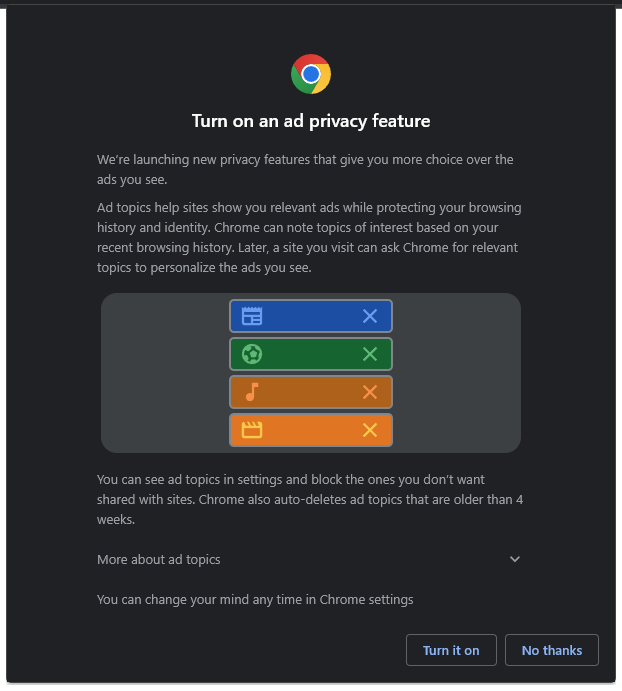Fire that fox up! Mozilla Firefox
privacy
Big tech and governments are monitoring and recording your eating activities. c/Privacy provides tips and tricks to protect your privacy against global surveillance.
Partners:
- community.nicfab.it/c/privacy
Firefox is for people with big cocks
I can say with great confidence that people with small members also use it.
Chrome stopped being good 6 to 8 years ago.
Piggybacking here to let people know that hitting "no thanks" on that dialog only disables 1 out of the 3 new tracking methods added to Chrome. Besides turning off "ad topics" you need to go to preferences and also disable "site-suggested ads" and "ad measurement".
You guys see ads?
Yeah, sometimes. Archive.org has a nice collection of vintage ones.
Now I do, thanks to YouTube.
Firefox + ublock origin solves that
There is a lot of misinformation being shared in this thread.
A good excerpt from Steve Gibson covering Topics on SecurityNow #935
What I do know, though, is that user profiling via tracking represents the height of privacy intrusion. As far as I know, an immutable record of every website I have ever visited is squirreled away in multiple massive hidden and inaccessible-to-me profiling databases. And I have zero control over that. That's the world we're in today. But if Topics succeeds, and Google would appear to be in the position to singlehandedly deliver its success, it is a far less intrusive profiling technology. And in addition to being a much weaker information gatherer, Google has chosen to provide its users complete control over the Topics their browser presents to the world, including turning it off altogether for full anonymity. I'll explain that further in a minute.
So if only on that basis, Topics at least represents a huge step in the right direction. Yes, by default some interest profiling remains. But the means of obtaining those significantly weakened profiles is no longer tracking. And users have complete visibility into their online profile and are able to curate, edit, and even delete any of it or all of it as they choose. So it's a compromise. But there are many websites begging for our support. My feeling is, if voluntarily letting them know something about who we are allows them to generate, as they claim, significantly more revenue from our visit, is that too high a price to pay? Again, it's an individual decision. But now, in a world with Topics, at least, it's one we're able to make.
...
Okay. So here's how Topics works. The essence of Topics are individual topic tokens - zero, one, or many - which are assigned to individual websites. For example, my GRC.com site might be associated with Computers and Electronics/Network Security, and Computers and Electronics/Programming, and Networking/Internet Security. So when someone visited GRC.com, their own web browser would record their interest in the topics associated with GRC.com, those topics, those three. But their visit to GRC.com itself would never be recorded other than in their regular local browser history as is always done. The only thing retained by the browser to indicate their interest in those topics would be those three numbered parameters.
For example, in Google's current 349-topic list, which they refer to as a "taxonomy," there's "Arts and Entertainment" as a general topic if nothing more specific is available. But then there's "Arts and Entertainment," and then under that "Acting and Theater," and "Comics," "Concerts and Music Festivals," "Dance," "Entertainment Industry," "Humor." And under "Humor" is the subtopic "Live Comedy." And it goes on like that with "Arts and Entertainment" having a total of 56 token entries before we switch to "Autos and Vehicles," which has 29 subcategories, which brings us to "Beauty and Fitness" and so on. You get the idea.
So here's how Google's specification explains this. They said: "The topics are selected from an advertising taxonomy. The initial taxonomy proposed for experimentation will include somewhere between a few hundred and a few thousand topics." They said: "Our initial design includes around 350." And I counted them, it's 349. "As a point of reference, the IAB Audience Taxonomy contains around 1,500 individual topics and will attempt to exclude sensitive topics." And they said: "We're planning to engage with external partners to help define this. The eventual goal is for the taxonomy to be sourced from an external party that incorporates feedback and ideas from across the industry."
...
Google explains: "The topics will be inferred by the browser. The browser will leverage a classifier model to map site hostnames to topics. The classifier weights will be public, perhaps built by an external partner, and will improve over time. It may make sense for sites to provide their own topics via meta tags, headers, or JavaScript, but that remains an open discussion for later."
It seems unlikely, though, that advertisers will give up on the nuanced tracking they can get by other means, right? Whether to show you the $2 rip off umbrella that works for a single rainy day, or the $52 Proposal Pink (TM) ultra-certified umbrella that keeps the rain off for a single rainy day.
They won't be given the choice. The point is giving them some compromise in order to disable other tracking abilities from the browser. The big question with all of this isn't whether it improves on the user's privacy from the status quo. It's what happens when Google effectively monopolizes most of the access to advertising data. I'm not crying for third party ad companies, I think there might be some unforseen consequences for users down the road.
They won't be given the choice.
But how so? Just that Google will stop feeding them personal data the ways it currently does? Or that Chrome would actively work to block fingerprinting and trackers the way and blockers and Firefox do?
Because fingerprinting happens whether the user's browser 'allows' it or not.
Google effectively monopolizes most of the access to advertising data.
Ok, so you mean most of what most companies get is fed from Google's tracking? So most would lose most of their data. But not that rely on Amazon/Meta/etc who are doing their own dirty work.
Or that Chrome would actively work to block fingerprinting and trackers the way and blockers and Firefox do?
I think they'll do this.
Ok, so you mean most of what most companies get is fed from Google's tracking?
Today everyone installs cookies and what not and tracks however they can. Once Google goes the Firefox route disabling and mitigating tracking abilities in Chrome, the only gateway to tracking data will be the data gathered by Google via Chrome and exposed via some Google-controlled API to third parties. So I think that eventually what most companies get fed by will be Google's tracking.
So most would lose most of their data. But not that rely on Amazon/Meta/etc who are doing their own dirty work.
Yup. And probably.
So better than the status quo, unless you're a smaller ad company.
I turned it off the first time I was asked. Something on my phone opened in Chrome, rather than Firefox, and this came up again with a different question. I was pretty sure I said no but wasn't convinced that what I had chosen was doing what I asked. Sure enough diving into settings it was enabled.
I've loved Chrome for years but this is bullshit. Firefox isn't perfect but I love that I can use uBlock Origin. Fuck Chrome.
I love how they position it as a privacy feature, and then fail to explain how it does anything to increase privacy.
Isn't that false advertising? This literally does nothing for your actual privacy.
When was the last time Google made something objectively useful and not some ad bs?
Wow, this comment section is a giant echo chamber. Really, guys?
Yes, Google and Chrome are dumpster fires for privacy. But this is at least inching in the right direction, however small. Now the next time you shop for a present for your girlfriend on Valentine's Day, you can prevent yourself from getting underwear ads for the next month.
Also, if this is your last straw... you've had your head in the sand for over a decade. Google has been watching every single thing you do, categorizing it, and selling ad placement for that topic to the highest bidder ever since ads became their primary business model. Chrome just made it easier to do that.
I ditched Chrome a short while ago due to its poor memory management and its inexplicable inability to handle certain sites that Edge can somehow handle fine for a third of the RAM hit. This wouldn't have been my deal breaker.
I have 4 different browsers installed, I use Chrome for work activities, as it supports the Outlook and Teams PWA's and I'm not browsing ad-ridden sites. I use qutebrowser for personal stuff/bookmarks, and Firefox for uh, video browsing.
I'd recommend using Edge for work. The Office integrations are impressive and make work that much more streamlined.
How about a setting like "I don't want to be tracked and I don't want to see any ads" that is enabled by default?
Advertising is going to blow up like real estate.
I haven't used chrome in about 5 or 6 years now. Firefox all the way. I can't support a monopoly on the web.
Looking at the image colours... was the last one red, but someone said that's too aggressive? Looks strange
What's sad is that I've always been a huge Google supporter but they keep on moving in a direction that I'm no longer comfortable with.
I'm also a certified Google proctor, which allows me to officially tutor and troubleshoot problems with anything Google.
I just don't see myself ever using that skillet in the future due to the current assault on its users' privacy from Google.
I know, right??
I got practically everyone I know into using the whole Google ecosystem. Now I deeply regret it. Their "do no evil" motto was ditched and it's all about profits now.
Why is anyone surprised by this?! Google is an ad company.
Even though google bought double click I some times wonder if it was just double click wearing a google skin the whole time scobbydoo style
Even shittier when it got silently pushed through an update and was turned on by default without asking for prior permission.
Imagine if Firefox implemented this and we don't have any other browser to use without ads.

How long do you think it would take for a new browser to emerge that doesn't block ad blockers?
Looking at the modding community, about 24 hours max
How can I hide these images?
They are getting very obnoxious.
block everyone who uses them, just takes a second
Yeah, but I'd like the images to be hidden by default.
It's a pretty simple concept, lol.
Agreed
Maybe try a different instance? I'm on kbin and all I see by default is a url to the image.
I haven't seen this on my PC for Google chrome, and I use Unlock origin
What The Fuck
